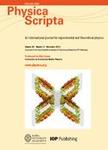版权所有:内蒙古大学图书馆 技术提供:维普资讯• 智图
内蒙古自治区呼和浩特市赛罕区大学西街235号 邮编: 010021
T=题名(书名、题名),A=作者(责任者),K=主题词,P=出版物名称,PU=出版社名称,O=机构(作者单位、学位授予单位、专利申请人),L=中图分类号,C=学科分类号,U=全部字段,Y=年(出版发行年、学位年度、标准发布年)
AND代表“并且”;OR代表“或者”;NOT代表“不包含”;(注意必须大写,运算符两边需空一格)
范例一:(K=图书馆学 OR K=情报学) AND A=范并思 AND Y=1982-2016
范例二:P=计算机应用与软件 AND (U=C++ OR U=Basic) NOT K=Visual AND Y=2011-2016


As the number of users in quantum key distribution (QKD) networks continues to grow, parameter selection (e.g., probability of X-bases, signal state strength, and decoy state levels) has become increasingly complex. Traditional methods such as local search algorithms (LSA) are commonly employed for parameter optimization but suffer from significant computational overhead, slow execution on low-power platforms, and resultant system delays. These limitations hinder the scalability and real-time requirements of large-scale QKD networks. To address these challenges, this paper proposes an innovative approach that combines Bayesian optimization with XGBoost model to optimize QKD system parameters. The proposed model is evaluated against random forest (RF) and back-propagation neural network (BPNN) models based on three critical metrics: prediction accuracy, model fitting, and training efficiency. Simulation results demonstrate that the proposed model significantly outperforms both RF and BPNN in terms of accuracy and computational efficiency. Notably, while achieving predictive performance comparable to LSA, the proposed method reduces computation time by three orders of magnitude. This research introduces a novel and efficient framework for QKD parameter optimization, providing new insights and directions for enhancing the performance, scalability, and real-time adaptability of QKD systems.

电话和邮箱必须正确填写,我们会与您联系确认。
版权所有:内蒙古大学图书馆 技术提供:维普资讯• 智图
内蒙古自治区呼和浩特市赛罕区大学西街235号 邮编: 010021

暂无评论